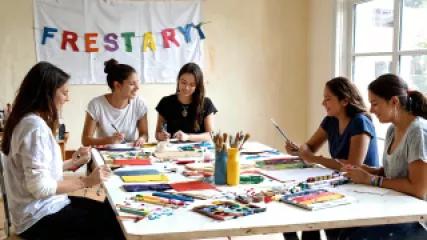Top 10 Expressive Arts Therapy Techniques for Improved Mental Health
Expressive arts therapy is a therapeutic approach that uses different forms of art, such as painting, dancing, music, and drama, to help individuals express and understand their emotions. It has been found to be extremely beneficial for improving mental health. In this article, we will explore ten top expressive arts therapy techniques that can help enhance mental well-being.
1. Visual Art Therapy
Visual art therapy is one of the most common forms of expressive arts therapy. It allows individuals to express their feelings and thoughts through drawing, painting, sculpting, or any other form of visual art. This technique helps in reducing stress, improving self-esteem, and providing a sense of accomplishment.
Benefit: Visual art therapy can give voice to experiences and emotions that are difficult to verbalize, facilitating a deep level of emotional healing.
2. Dance/Movement Therapy
Dance/movement therapy harnesses the power of physical movement and dance to promote emotional, mental, and physical healing. It focuses on the connection between the mind and body to improve mental health.
Benefit: It offers an outlet for self-expression, reduces anxiety, and improves body image and self-esteem.
3. Drama Therapy
Drama therapy uses role-playing, storytelling, and improvisation to explore personal issues and promote psychological healing. It provides a safe space for individuals to explore difficult emotions and experiences.
Benefit: It can improve communication skills, boost confidence, and provide relief from traumatic experiences.
4. Music Therapy
Music therapy involves using music—either listening to it, creating it, or both—to elicit emotional responses and promote healing. It can be particularly effective for people who struggle with verbal communication.
Benefit: It can reduce stress and anxiety, improve mood, and provide a sense of comfort and safety.
5. Writing Therapy
Writing therapy, also known as expressive writing, involves expressing emotions, thoughts, and experiences through the written word. This can be done via journaling, poetry, or storytelling.
Benefit: Writing therapy can help individuals process their feelings, reduce stress, and gain a better understanding of their emotional states.
6. Sand Tray Therapy
Sand tray therapy is a form of expressive arts therapy where individuals create scenes or images in a sandbox. The objects and their arrangement in the sandbox can reflect the individual's inner world, helping therapists understand their feelings and thoughts.
Benefit: It can help individuals express feelings that they may find difficult to put into words, facilitating improved communication and personal insight.
7. Play Therapy
Play therapy is usually used with children to help them express their emotions and work through traumatic experiences. It uses toys and games to help children communicate their feelings and problems in a safe and comfortable environment.
Benefit: It can help children develop coping mechanisms, improve their social skills, and establish a better sense of self.
8. Phototherapy
Phototherapy uses photographs to explore feelings, memories, and identity. Individuals can use their own photos or those provided by the therapist to discuss their emotions and experiences.
Benefit: It can facilitate self-discovery, enhance self-esteem, and aid in the healing of emotional wounds.
9. Art Journaling
Art journaling is a form of expressive arts therapy that combines visual art and writing. It allows individuals to create a visual diary of their thoughts, feelings, and experiences.
Benefit: It can help reduce stress, improve self-awareness, and foster emotional healing.
10. Puppetry Therapy
Puppetry therapy uses puppets for storytelling and role-playing. It can be particularly effective with children, but it can also be used with adults. It can help individuals express their emotions and confront difficult situations in a non-threatening way.
Benefit: It can improve communication, foster emotional growth, and provide a sense of empowerment.
In conclusion, expressive arts therapy offers a variety of techniques that can help individuals improve their mental health by providing them with creative outlets for self-expression. Whether it's through painting a picture, dancing to music, or writing in a journal, these therapeutic approaches can facilitate emotional healing, self-discovery, and a better understanding of oneself. Remember, the key to successful therapy is finding the method that resonates most with you. So, don't be afraid to explore different techniques until you find the one that best meets your needs.






